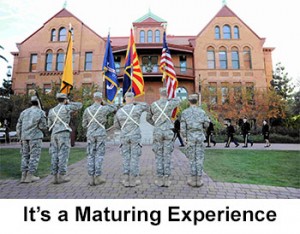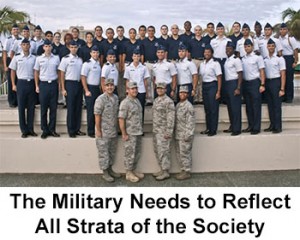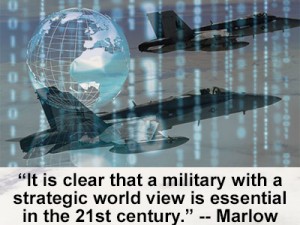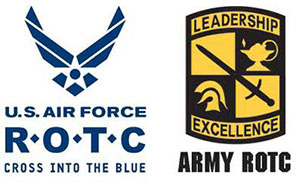In a recent feature-length viewpoint article in the Clarion, the house organ of the Professional Staff Congress (the union representing professors in the City University of New York system) Baruch College colleague Glenn Petersen, Ph.D. strongly rebuffed the Pentagon’s push to establish Reserve Officer Training Corps (ROTC) programs on CUNY’s campuses. The Pentagon’s motivation: a disproportion of the military’s leadership come from the southern states, not enough from the northern states. It argues CUNY’s student population and demographics are, therefore, ripe for an ROTC program.
Dr. Petersen’s perspective is guided in part by the fact that he served (as a teenager) in Vietnam. That “war”—from which the United States emerged not the winner, to put it somewhat euphemistically—left a bad taste in everyone’s mouth.
I know this from direct experience. I served four years in the United States Air Force (1966-1970) during the Vietnam era in Texas, Illinois, California, and Guam (in the South Pacific). I was in my early twenties, having already completed my first undergraduate degree at what is now Herbert Lehman College (CUNY). When I returned to New York City in 1971 to seek my fortune, no one, and I mean no one, wanted to know about my four years in uniform due to the strong anti-Vietnam war sentiment that permeated the nation. It was a depressing experience for a young man with a BA and an MBA under his belt (the graduate degree thanks to the GI Bill). That feeling has never really left me.
My experience of the war, therefore, is somewhat different from Professor Petersen’s and my reaction to the ROTC issue is also different. I think the presence of ROTC is a good thing.
It’s A Maturing Experience
 Two weeks after graduating from Lehman College in the Bronx in 1966, I received a draft notice. In June 1966 I chose to volunteer for the United States Air Force, a hitch that lasted four years, as opposed to the two years I would have served in the United States Army. Frankly, it was a survival strategy. I gave two more years of my life to the United States military rather than possibly risking losing my life in the jungles of Vietnam. Looking back on this strategic decision I have mixed emotions and I still wrestle with the moral consequence of this decision.
Two weeks after graduating from Lehman College in the Bronx in 1966, I received a draft notice. In June 1966 I chose to volunteer for the United States Air Force, a hitch that lasted four years, as opposed to the two years I would have served in the United States Army. Frankly, it was a survival strategy. I gave two more years of my life to the United States military rather than possibly risking losing my life in the jungles of Vietnam. Looking back on this strategic decision I have mixed emotions and I still wrestle with the moral consequence of this decision.
On the other hand, I traveled half way around the world to Guam in the South Pacific courtesy of the U.S. government. Guam’s Anderson Air Force Base is not Hawaii or Bali, but while there I experienced another part of the planet and grew as a writer—I was on temporary assignment from my position as a wing historian at Castle Air Force Base in Merced, California. Castle was the training base for all of Strategic Air Command. I was assigned to the historian section on Guam. There I was supervised by a civilian, Dr. Kritt, who taught me a thing or two about historical writing.
The four year experience—that took me from New York City, to Texas, Illinois, California, and Guam and back to California again—was a maturing period. I was honorably discharged in June 1970 and remained on inactive reserves until June 1972.
It’s A Unique Educational Experience
While I was in the Air Force I met people from all over the country and some from other parts of the world—the government didn’t care if you were not born in the U.S.; if you were in this country and of the proper age, regardless of citizenship, you were eligible for the draft. These folks were of varying degrees of ethnicity, cultural and religious background, and educational attainment—from high school diplomas to doctoral degrees. The variety of human beings—from slick sleeve airmen to four star generals—was reflective of the American melting pot. In effect, the draft brought unlikely young men and  women together in one place at one time, and the mixing up of these cultures provided a healthy shot in the arm to the usually perceived military credo of rank and file, hierarchy, and “groupness.” It was an education in itself. I learned more about organizational communications–both effective and ineffective–and structure from my four years in the military than at any time.
women together in one place at one time, and the mixing up of these cultures provided a healthy shot in the arm to the usually perceived military credo of rank and file, hierarchy, and “groupness.” It was an education in itself. I learned more about organizational communications–both effective and ineffective–and structure from my four years in the military than at any time.
The Military Needs to Reflect All Strata of the Society
I keep wondering if the elimination of the draft and the creation of an all-volunteer military has damaged what used to be a healthy heterogeneous experience into one that promotes homogeneity to the military’s own detriment. Is there a danger in the loss of a demographically heterogeneous military? To put this in biological terms, the elimination of the draft limits the gene pool that was richer personnel-wise prior to 1973.
Shared Bonds Tie the Nation
There’s another unintended consequence: the elimination of the draft diminished the concept of community service on a national scale. When veterans returned from World War II there was a strong sense of community and civic engagement among veterans that could not be duplicated artificially. The shared military experience created a bond even among the many who did not serve in the same place or time. The shared military experience creates a unique sense of community and understanding.
Better Understanding of Returning Vets
 To reiterate, when I returned to New York City after having completed my four-year commitment followed by 18 months of graduate work in business administration, the reception I received was no reception at all. No employer wanted to know or cared about the military experience I had successfully completed. Today, returning veterans from the Iraqi and Afghanistan wars get much better treatment, but the governmental support for these veterans in terms of easing them back into civilian society is nominal when it should be a much higher priority. The larger the pool of people who go through the military experience and then assimilate back into civilian life will produce a society with greater understanding and appreciation for the military’s role and the contributions of the individual.
To reiterate, when I returned to New York City after having completed my four-year commitment followed by 18 months of graduate work in business administration, the reception I received was no reception at all. No employer wanted to know or cared about the military experience I had successfully completed. Today, returning veterans from the Iraqi and Afghanistan wars get much better treatment, but the governmental support for these veterans in terms of easing them back into civilian society is nominal when it should be a much higher priority. The larger the pool of people who go through the military experience and then assimilate back into civilian life will produce a society with greater understanding and appreciation for the military’s role and the contributions of the individual.
Educational Benefits That Pay Dividends for Generations to Come
My four years of military service gave me the GI Bill. Those funds gave me the opportunity to earn an MBA (general management), then a Ph.D. (media studies). Those degrees gave me the credentials to become a college professor and much more.
Having ROTC programs on CUNY campuses offers potential students the opportunity to have the government pay for their undergraduate education and after service the GI Bill to pay for even higher learning. ROTC programs on CUNY campuses offer the government the prospect of a future military leadership that is more evenly distributed among regions of the country and ethnicities. Down the road, when these newly tapped leaders emerge from the military, the community benefits from a larger pool of people who have shared the military experience. These same people will have also had the opportunity to experience other parts of the world. They will be more mature and more exposed to world cultures. This, too, can benefit the larger community.
 As faculty we are supposed to be open to new ideas and paradigms. While an ROTC program is an old concept, in today’s “no draft world” it is new again. The anti-war attitudes of the 1960s and 1970s were appropriate then. But in the early 21st century it is clear that a military with a strategic world view is essential. When the military’s leadership reflects a narrow demographic, it could, in turn, reflect a narrow strategic view. Just as faculty and PSC members we officially encourage an inclusive attitude towards academic decision-making, as citizens we also need to encourage a more inclusive attitude towards the military that, whether we appreciate it or not, has a strong hand in keeping us warm and safe in our beds at night.
As faculty we are supposed to be open to new ideas and paradigms. While an ROTC program is an old concept, in today’s “no draft world” it is new again. The anti-war attitudes of the 1960s and 1970s were appropriate then. But in the early 21st century it is clear that a military with a strategic world view is essential. When the military’s leadership reflects a narrow demographic, it could, in turn, reflect a narrow strategic view. Just as faculty and PSC members we officially encourage an inclusive attitude towards academic decision-making, as citizens we also need to encourage a more inclusive attitude towards the military that, whether we appreciate it or not, has a strong hand in keeping us warm and safe in our beds at night.
Let us welcome the ROTC with open minds, not only at CUNY, but at universities and colleges all over the United States.
Please write to me at meiienterprises@aol.com if you have any comments on this or any other of my blogs.
Eugene Marlow, Ph.D.
October 14, 2013
© Eugene Marlow 2013


